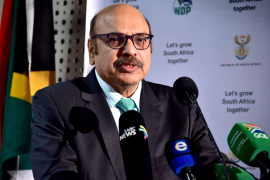
Legal Services Ombud, Judge Siraj Desai, has called on legal practitioners and the media to show decorum in the courts and legal practice.
Desai was speaking at a media briefing on Tuesday to update the nation on the functioning of the Ombud’s office.
“What is important... is that there are many instances of breaches by attorneys, which appear in the public domain. Although we are reliant upon complaints being laid with us, we are not a complaint referral body. We can, of our own accord, look at what is happening in the country and take up an issue.
“I am deeply concerned about the fact that there is a crumbling of observing legal ethics in the practise by lawyers, which impacts not only upon the image of the organisation but also impacts upon the sense that justice has been done in a matter.
“It is important that all practitioners observe decorum in our courts and project the image of the profession. It is a vital core of democratic practice that justice simply is not a judgment delivered but the process of judging is made an acceptable norm,” he said.
Desai said “excessive fees” charged by legal practitioners are creating a two tier justice system, which disadvantages the poor.
“One of the key issues that keeps on arising… are the excessive fees charged by private practitioners. I’m not suggesting that it should be regulated but if the practitioners do not bring a sense of realism to the fees that they charge to the actual practice to clients, they not only diminish the profession and make it inaccessible to the poor, but they also create two tiers of justice: justice for the poor and justice for the rich, with the rich getting the best available counsel.
“We must ensure that even the poor have the best of counsel and that justice is to them an equal source of relief, as it is for the very rich. As a country, we face challenges… to make a functioning democracy accessible and I hope, as Ombud, to contribute to that process,” he said.
The Ombud also had words of caution for media, which plays a role in broadcasting and reporting upon matters in the courts.
“I accept that television is important, that recording of evidence is important and that the display of the functioning judiciary is important to the public.
“We’ve gone a long way in making the courts open and transparent but let us not let the side down by impinging upon the integrity of the court, which then ultimately affects its functioning,” he said. – SAnews.gov.za


